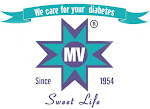Mrs.sheela Paul
Chief Dietitian
Reactive hypoglycemia is a medical condition occurring from low sugar in the blood. It is mainly associated with people who suffer from diabetes, but has been also know to occur in non-diabetics. Though there are some people who experience this state even if they are not fasting, and the blood sugar drops irrespective of there food intake--this condition is referred to as reactive hypoglycemia.
So how does the sugar in the blood drop?
The most common cause of this is when a person goes hungry for a long period of time or is in a state of fasting. Basically the body needs food to keep all its functions going correctly, so if a person is fasting the body does not have the necessary fuel and so the sugar levels drop.
There has been quite a bit of research done on this subject and many researchers and experts have come to believe that this condition is mainly caused by the lack of a hormone called Glucagon. This hormone is the one that is mainly responsible for keeping the balance levels of sugar in the blood.
The main symptoms of this condition can be confused with other diseases as they are quite similar.
Listed here are of the symptoms of hypoglycemia:
-Dizziness, sweating, hunger
-Inability to sleep
-Excessive sweating
-Trembling and being nervous all the time
-Fatigue and tiredness.
A simple healthy diet will greatly help in improving your condition, like eating more often, up to 6 times a day. You don’t need to eat a lot every time, just small meals every three hours. Skipping meals will cause your blood sugar to fall down, as well as not eating for longer periods of time can have the same effect.
Nutrition tips to manage hypoglycemia
• Eat a small meal or snack about every 2-3 hours. Skipping meals can make symptoms worse.
• Choose high fiber foods at each meal and snack.
Fiber helps stabilize blood sugar. Increase fluid intake when you increase fiber intake.
• Eat a source of protein and or a source of fat with carbohydrate at each meal or snack.
Protein and fat eaten with carbohydrates will help slow glucose release and absorption.
• Limit simple sugars. (candy, soda, fruit juice, sweets)
Simple sugar intake can make hypoglycemia symptoms worse. Moderate your intake.
• Limit alcohol and caffeine (coffee, tea, soda, chocolate).
• Eat a meal or snack 1-3 hours before exercise.
Extra carbohydrates may be needed before exercise to compensate for energy used.
Physical Activity: Although excessive physical activity can bring your blood sugar level low, a simple exercise is still beneficial. All you need to do is to time your activity after a meal to make sure that your insulin hormone will have the needed sugar to break down in your system. Make sure not to overdo your physical activities as this can lead to sudden drop in your blood sugar level. Don’t forget to consult your physician before engaging in extra physical activities, they can best advice on how much exercise you can handle.
Controlling this condition can be done through right diet, which is the only treatment available for now. Following a healthy eating lifestyle can help blood sugar levels steady, as well as provide you with the necessary nutrients you need for good health. If you believe you are suffering from Reactive Hypoglycemia, it is best to consult a physician and a dietician to help plan your treatment.
Welcome to M.V Hospital for Diabetes, established by late Prof. M.Viswanathan, Doyen of Diabetology in India in 1954 as a general hospital. In 1971 it became a hospital exclusively for Diabetes care. It has, at present,100 beds for the treatment of diabetes and its complications.
Friday, October 8, 2010
Reactive Hypoglyceamia
|
Bookmark this post:
|
|
Subscribe to:
Post Comments (Atom)







I think your article its very important and interesting,good work,Thank you for sharing such kind of information.Blogs are so
ReplyDeleteinformative where we get lots of information on any topic. Nice job keep it up!!